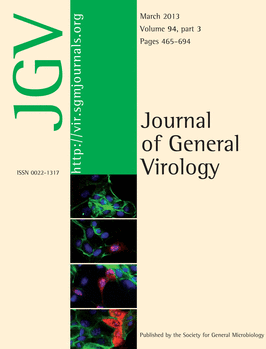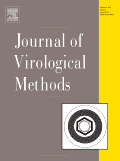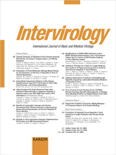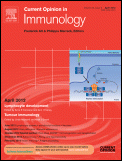
JOURNAL OF GENERAL VIROLOGY
Scope & Guideline
Connecting researchers to the latest virology advancements.
Introduction
Aims and Scopes
- Viral Pathogenesis and Host Interactions:
Research focusing on how viruses cause disease, mechanisms of pathogenesis, and the host's immune responses to viral infections. - Virus Classification and Taxonomy:
Studies that contribute to the understanding of virus taxonomy, including the discovery of new viral species and the classification of viruses based on genomic and phenotypic characteristics. - Viral Genomics and Molecular Biology:
Investigations into viral genomes, including their structure, function, and evolutionary dynamics, as well as the molecular mechanisms underlying viral replication and transcription. - Viral Immunology and Vaccine Development:
Research related to the immune response to viral infections and the development of vaccines, including preclinical and clinical studies. - Vector Biology and Transmission Dynamics:
Studies exploring the biology of viral vectors and the dynamics of virus transmission in various environments, including zoonotic and vector-borne viruses. - Antiviral Research and Therapeutics:
Research aimed at discovering and developing antiviral agents and therapies to combat viral infections.
Trending and Emerging
- COVID-19 and SARS-CoV-2 Research:
A significant increase in studies focusing on SARS-CoV-2, its variants, and associated diseases has been observed, driven by the global pandemic and the need for effective vaccines and therapeutics. - Viral Immunology and Immune Evasion Mechanisms:
An emerging focus on understanding how viruses evade host immune responses, including studies on immune modulation and the development of antiviral strategies. - Zoonotic and Vector-borne Viral Infections:
Research on zoonotic viruses and their transmission dynamics has gained prominence, particularly in light of emerging infectious diseases that originate from animal reservoirs. - Viral Genomics and Metagenomics:
The application of advanced genomic techniques, including metagenomics, to characterize viral diversity and dynamics in various environments is on the rise, facilitating the discovery of novel viruses. - Therapeutic Interventions and Antiviral Drug Development:
An increasing number of studies are focusing on the development of antiviral therapies and the mechanisms of action of antiviral drugs, reflecting a growing emphasis on clinical applications.
Declining or Waning
- Plant Viruses and Agricultural Virology:
Research on plant viruses and their impact on agriculture has lessened, possibly due to a focus on human and animal viral pathogens, especially following the COVID-19 pandemic. - Historical Virology Studies:
There seems to be a reduction in studies focused on historical aspects of virology, including the evolution of viral diseases over time, as researchers emphasize current and emerging viral threats. - Viral Ecology and Environmental Virology:
The exploration of viruses in environmental contexts, such as aquatic or soil virology, has decreased, possibly overshadowed by more immediate health-related virology research. - Non-infectious Disease Associations:
Research linking viral infections to non-infectious diseases appears to be declining, as the journal focuses more on direct viral pathogenesis and host interactions.
Similar Journals

Journal of Clinical Virology Plus
Connecting knowledge to enhance public health strategies.The Journal of Clinical Virology Plus, published by Elsevier, is an essential resource for researchers and professionals in the fields of virology and infectious diseases. Launched in 2021, this journal aims to bridge the gap between clinical research and application, fostering a deeper understanding of viral pathogenesis, diagnostics, and therapeutic strategies. With an ISSN of 2667-0380, this open-access journal brings cutting-edge findings to the global scientific community, facilitating the rapid dissemination of knowledge critical for advancing public health. Positioned in the Q3 category for both Infectious Diseases and Virology in 2023, its ranking reflects its growing influence and relevance in the academic landscape. The journal strives to support innovative research, collaborative studies, and comprehensive reviews that address contemporary challenges in clinical virology. As it converges through the years from 2021 to 2024, Journal of Clinical Virology Plus aims to be a central hub for vital discussions and breakthroughs in this dynamic field.

JOURNAL OF VIROLOGICAL METHODS
Transforming viral research with novel methodological insights.Journal of Virological Methods, published by Elsevier, is a prominent peer-reviewed journal dedicated to advancing the methodologies employed in virology research. Since its inception in 1980, this esteemed journal has become a vital resource for researchers, professionals, and students focused on the intricate study of viruses and viral-related diseases. With a current ISSN of 0166-0934 and an E-ISSN of 1879-0984, this journal strives to present innovative techniques and tools that enhance our understanding of virology. Designed for a global audience, it operates in a rigorous academic environment, as reflected by its 2023 Scopus ranking of #40 in the Virology category and its Q3 quartile placement. The journal is committed to fostering open dialogue and collaboration within the scientific community, ultimately contributing to the development of novel strategies and interventions against viral infections. By offering comprehensive insights into virological methodologies, the Journal of Virological Methods continuously serves as a cornerstone for those dedicated to exploring the complexities of viral research.

INTERVIROLOGY
Advancing virology through innovative research.INTERVIROLOGY is a leading academic journal dedicated to advancing the field of virology and infectious diseases, published by KARGER. With a commendable history since its inception in 1973, the journal is currently poised to explore innovative virological research through to 2024. INTERVIROLOGY is indexed with the ISSN 0300-5526 and E-ISSN 1423-0100, reflecting its commitment to maintaining high scholarly standards. The journal is categorized within the Q3 quartile for both Infectious Diseases and Virology as of 2023, demonstrating its relevance and contribution to the academic community. With Scopus rankings placing it as #130 in Infectious Diseases and #41 in Virology, INTERVIROLOGY serves as an essential resource for researchers, professionals, and students seeking cutting-edge insights and discoveries in virology. While it currently operates under a subscription model, its rigorous peer-review process ensures a high quality of published content, making it a cornerstone for those dedicated to understanding and combating viral diseases.

Frontiers in Virology
Connecting Researchers for Global Viral SolutionsFrontiers in Virology, published by FRONTIERS MEDIA SA, is an innovative open-access journal dedicated to advancing the understanding of viral biology, pathogenesis, surveillance, and control strategies. With the rapid evolution of viral threats, this journal serves as a critical platform for researchers, professionals, and students to disseminate and access high-quality research, reviews, and perspectives in virology. The journal places a strong emphasis on interdisciplinary approaches, promoting collaborative efforts that drive breakthroughs in the field. While the specific impact factor and H-index details are currently unavailable, Frontiers in Virology is committed to rigorous peer review and integrity in scientific publishing. Authors and readers will benefit from the extensive reach provided by open access, making groundbreaking insights available to a global audience, thus contributing significantly to the ongoing dialogue in virology and public health.

REVIEWS IN MEDICAL VIROLOGY
Advancing the Frontiers of Virology ResearchREVIEWS IN MEDICAL VIROLOGY is a premier academic journal published by Wiley, dedicated to advancing the field of virology and infectious diseases. Established in 1991, this journal has gained a reputable standing, holding a Q1 ranking in both Infectious Diseases and Virology as of 2023, with impressive Scopus rankings placing it at #17 out of 344 in the realm of Medicine - Infectious Diseases, and #8 out of 80 in Immunology and Microbiology - Virology. This reflects its substantial impact factor and contribution to ongoing research and scholarship. While it is not an Open Access publication, REVIEWS IN MEDICAL VIROLOGY offers vital insights and comprehensive reviews that cater to a diverse audience including researchers, healthcare professionals, and students pursuing knowledge in medical virology. The journal serves as a vital resource for understanding the complexities of viral pathogens and the evolving landscape of antiviral therapeutics, making it an essential read for those poised at the forefront of infectious disease research.

VIROLOGICA SINICA
Connecting Researchers to the Latest in VirologyVIROLOGICA SINICA, published by KEAI PUBLISHING LTD, is a leading international journal dedicated to the field of virology. With an ISSN of 1674-0769 and E-ISSN of 1995-820X, this esteemed journal showcases cutting-edge research from 2006 to 2024, focusing on critical developments in Immunology, Infectious Diseases, Molecular Medicine, and Virology. As evidenced by its respectable positioning in the Q2 quartile of relevant categories and impressive Scopus rankings—such as Rank #20/80 in Virology—VIROLOGICA SINICA serves as an essential resource for researchers, professionals, and students aiming to deepen their understanding of viral pathogens and their impact on human health. While the journal does not currently offer open access, it remains an invaluable publication for those seeking to stay at the forefront of virology research. Its address is located at 16 Donghuangchenggen North St, Beijing, China, where it continues to foster academic excellence in the rapidly evolving landscape of virology.

Annual Review of Virology
Advancing virology through comprehensive insights.Annual Review of Virology is a premier scholarly journal published by Annual Reviews, dedicated to advancing the field of virology through comprehensive and insightful reviews. Since its inception in 2014, this journal has established itself as a leading resource for researchers, professionals, and students alike, achieving an impressive Q1 ranking in the field of Virology and a Scopus rank of #10 out of 80 in its category, placing it in the 88th percentile. The journal features in-depth analyses of the latest developments in virology, encompassing various aspects such as viral pathogenesis, host interactions, and antiviral strategies, thereby catering to a diverse audience seeking the most relevant and cutting-edge information. Although it is not Open Access, Annual Review of Virology remains an indispensable tool for those engaged in virology research, transforming complex findings into accessible knowledge that shapes future investigations and practical applications in the field.

Tuberculosis
Empowering researchers to combat global health challenges.Tuberculosis is an esteemed peer-reviewed journal specializing in the fields of Infectious Diseases, Immunology, and Microbiology, published by Churchill Livingstone since 1974. With a scope aimed at advancing the understanding and management of tuberculosis and related infectious diseases, the journal provides a platform for innovative research findings, clinical practices, and policy discussions. It is ranked in the Q2 category for both Infectious Diseases and Microbiology (medical), reflecting its significance in the academic community and the impact of its published work. The journal's commitment to openness is evident in its access options, fostering wider dissemination of knowledge. With an impact factor that underscores its relevance, Tuberculosis serves as a crucial resource for researchers, healthcare professionals, and students dedicated to combatting these pressing health challenges. The journal operates from its production headquarters in Edinburgh, Scotland, ensuring a strong connection to the international research community.

CURRENT OPINION IN IMMUNOLOGY
Advancing the Frontiers of Immunological ResearchCURRENT OPINION IN IMMUNOLOGY is a prestigious journal dedicated to the dynamic field of immunology, published by CURRENT BIOLOGY LTD in the United Kingdom. With an ISSN of 0952-7915 and an E-ISSN of 1879-0372, this journal has been a cornerstone of scholarly communication since its inception in 1988 and continues to disseminate cutting-edge research and reviews aimed at advancing our understanding of immune responses. Holding a remarkable Q1 ranking in both Immunology and Allergy categories for 2023, it ranks impressively within the top percentiles in its field, securing 27th233 in Immunology and Allergy and 31st out of 236 in Immunology and Microbiology. Emphasizing high-impact research, the journal provides researchers, professionals, and students with valuable insights into emerging trends and critical developments. As a vital resource in immunological research, it serves as a platform for disseminating innovative findings, fostering collaboration, and enhancing scholarly exchange in a rapidly evolving scientific landscape.

VIRUS GENES
Illuminating the Pathways of Viral ResearchVIRUS GENES is an esteemed journal published by Springer, dedicated to advancing our understanding of virology and its related fields, including genetics, molecular biology, and immunology. With a publication history that spans from 1987 to 2024, this journal provides researchers and professionals with a platform to disseminate high-quality, peer-reviewed articles that explore the intricacies of viral genetics and their implications in health and disease. With an impact factor placing it in the Q3 quartile across multiple categories in 2023, including Genetics and Virology, VIRUS GENES serves as a crucial resource for academics seeking to stay at the forefront of viral research. Its commitment to showcasing innovative research makes it an invaluable asset for students and professionals aiming to deepen their knowledge in the rapidly evolving landscape of virology. Although currently not offering Open Access, the journal ensures wide accessibility through institutional subscriptions, thereby playing a vital role in the collaboration between scientists globally.